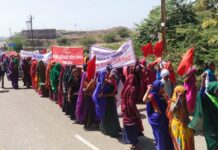The petition has been filed by two advocates and one journalist, who have been booked under UAPA in connection with their social media posts and work related to the recent communal violence in Tripura
Section 2(1)(o) of the Unlawful Activities (Prevention) Act, 1967 (UAPA) which defines ‘unlawful activity’ has been challenged before the Supreme Court of India [Mukesh v. State of Tripura].
The petitioners, two advocates and one journalist, who have been booked under UAPA in connection with their social media posts and work related to the recent communal violence in Tripura, have criticized Section 2(1)(o) read with Sections 13 and 43D(5) of the UAPA.
While Section 2(1)(o) defines ‘unlawful activity’, Section 13 provides for punishment for ‘unlawful activity’ and Section 43D(5) lays down restrictions on grant of bail for UAPA offences.
The petitioners have contended that the definition of ‘unlawful activity’ prohibits innocuous speech by threat of punishment.
The amended Sections allow the government to notify any individual as a terrorist. The petitioners have contended that such labelling will lead to a lifelong stigma. It would also be against the fundamental rights guaranteed under Articles 14, 19, and 21 of the Constitution of India, it was submitted.
“The definition casts a ‘wide net’ on freedom of speech and expression and makes even ideas, thoughts and discussions which pose no threat to security of India and have no tendency to create public disorder punishable under Section 13 of the Act of 1967.
The over broad language of the section leaves open the possibility that the person criticising measures of government or acts of public officials, might also come within the ambit of the penal section,” the plea said.
The petition filed through advocate Prashant Bhushan, contended that the definition of ‘unlawful activity’ is vague and it fails to define criminal offence with sufficient definiteness.
“The unlawful activities are defined in such a vague manner to make its application solely on the discretion of police machinery. Neither the accused would be put on notice as to what exactly is the offence which has been committed nor would the authorities administering the section be clear as to on which side of the draw a particular speech/expression will fall,” the petition stated.
Terms like “sovereignty and territorial integrity of India” and “disaffection against India” used in the Section are very broad, the petitioners submitted.
Moreover, due to the absolute bar on anticipatory bail under Section 43D(4) of the Act and the impossibility of securing bail under Section 43D(5) of the Act, Section 2(1)(o) produces a chilling effect on freedom of speech and expression, the plea said.
It is, therefore, a provision that forces people to self censor their views because of fear of criminal action and therefore violates freedom of speech and expression guaranteed under Article 19(1)(a) of Constitution of India, the petitioners contended.
The petition besides assailing Constitutional validity of the provision also sought quashing of FIRs filed against petitioners by the Tripura Police.
The plea was mentioned before Chief Justice of India NV Ramana yesterday for urgent hearing and the Court agreed to list the same.
Various provisions of UAPA are already under challenge before different Constitutional courts in India including the Supreme Court.
Are we living in a police state? Justice Gupta Questions UAPA, Sedition and NSA
The amendments made to UAPA in 2019 are under challenge before the top court. In the said plea, validity of Sections 35 and 36 of the UAPA, as amended by the UAPA Amendment Act, 2019 have been assailed by one Sajal Awasthi and an NGO, Association for Protection of Civil Rights.
The amended Sections allow the government to notify any individual as a terrorist. The petitioners have contended that such labelling will lead to a lifelong stigma. It would also be against the fundamental rights guaranteed under Articles 14, 19, and 21 of the Constitution of India, it was submitted.
The plea is pending before the top court.
Many eminent lawyers and activists also petitioned against sections of UAPA
Bhima Koregaon accused Anand Teltumbde has filed a petition before the Bombay High Court challenging Section 43D of UAPA on bail as well as misuse of the term “front organisation” by the National Investigation Agency (NIA).
He has submitted that Section 43D of UAPA creates an insurmountable hurdle for any accused to be granted bail.
By virtue of the provision, bail is denied to the accused for many years, at times till the end of the trial, the plea stated
Regarding the definition of “front organisation”, he has submitted that the same is very broad and misused.
Recently, retired Supreme Court judge Justice Rohinton Nariman had urged the top court to strike down offensive portions of UAPA along with sedition under Section 124A of the Indian Penal Code.
Tribute to Fr. Stan Swamy is to Demand the Scrapping of UAPA & NIA
Justice Nariman said that the Supreme Court should not leave it to the government to remove the offending laws from the statute book but should instead use its powers of judicial review to strike down the law, so that citizens can breathe more freely.
“I would exhort the Supreme Court to not send sedition law cases pending before it back to the Centre. Governments will come and go (but) it is important for the court to use its power and strike down Section 124A and offensive portion of UAPA. Then citizens here would breathe more freely,” he said.




























